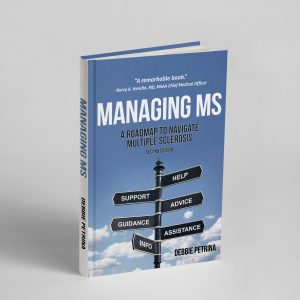“Want some help?”
Everybody wants a cure for MS, to halt the progression of it, and restore the damage it causes to us. But what do you do in the meantime until those things happen?
You manage your MS effectively.
If you ask people with MS how they manage it, most would respond by saying what treatments/meds they are taking and then add that they may exercise, do yoga, etc.
While this is true, it’s only a small part of a big answer. Everything about MS is complicated: the diagnosis, the symptoms and relapses, treatments, health team support, relationships, the explanation… ALL of these things have to be managed effectively in order to survive MS.
One who manages their MS effectively is also helping to control their symptoms, relapses and the course and thus progression of their case. Yes, let me repeat that– One who manages their MS effectively is also helping to control their symptoms, relapses and the course and thus progression of their case.
I know, and I know countless others who know. Beginning in 1980, I’ve lived with it for 34 years, and have been actively involved in the MS community for nearly thirty years. An ordinary person of moderate means, I went through motherhood, had a career I had to eventually give up, managed a household, and enjoyed life.
In a nutshell, these are the main objectives in managing MS:
1. Prevent sickness/infections, physical problems, and long-term chronic stress.
Why? Because any of these will trigger a relapse. And relapses usually result in progression and nervous system damage.
2. Take care of your body in all ways to be healthy.
This includes getting enough sleep, exercise, eating sensibly, managing stress, being mentally and emotionally happy, etc. This also includes things like weight watching, no smoking, etc.
Why? Staying healthy keeps one’s resistance up to prevent getting sick (thus preventing relapses) as well as keeping symptoms from intensifying. In addition, maintaining wellness helps prevent your body from getting other serious problems like high blood pressure, diabetes, poor circulation…
3. Carefully choose and monitor your treatments.
While drugs are often helpful for treating symptoms, relapses and slowing progression of MS, there are downsides. First, one must remember that all drugs have side effects that add stress and other impairments to the body. Second, MS is a life sentence; one may live decades until a cure is discovered to halt progression or restore damage. Every drug taken is passed though the liver and has other risks. There is not a treatment that exists today that totally halts progression, relapses, or improves symptoms.
4. Use a 2-prong approach when managing symptoms.
In addition to using medications, there are SO many ways that MS symptoms can be managed non-medicinally—pain, spasticity, bladder issues… Often, using a combination of using medicinal and non-medicinal means together can be helpful as well. For example, I take baclofen and do stretching exercises daily to reduce my spasticity.
In addition, alternative non-medicinal therapies have been successful like yoga, acupuncture, massage, pilates, etc. to help with symptoms.
Managing MS effectively requires a tremendous amount of knowledge and support. It’s hard, it takes time, requires change, but it works. However, learning to managing MS is a daunting task because we know that no two MS cases are alike and the disease is so unpredictable. Furthermore, because there is so much information available from so many sources, one can become overwhelmed and confused.
Want some help?
My book “Managing MS: Straight Talk…” is now available on eBooks for only $2.99 . You can also check out my website below for oodles of info—articles/resources with links, videos, my MS blog of nearly seventy articles, my credentials… The information is accurate, easy to understand, and concise.
My personal mission is to help others dealing with MS, and these two tools—my book and my website—will definitely help you with something. There is nothing to lose, and I guarantee something to gain!
**Video: “How to Manage MS: Two Tools”
https://www.youtube.com/watch?v=iliPH66JCaw
www.DebbieMS.com
Author/MS Counselor/Living with MS


